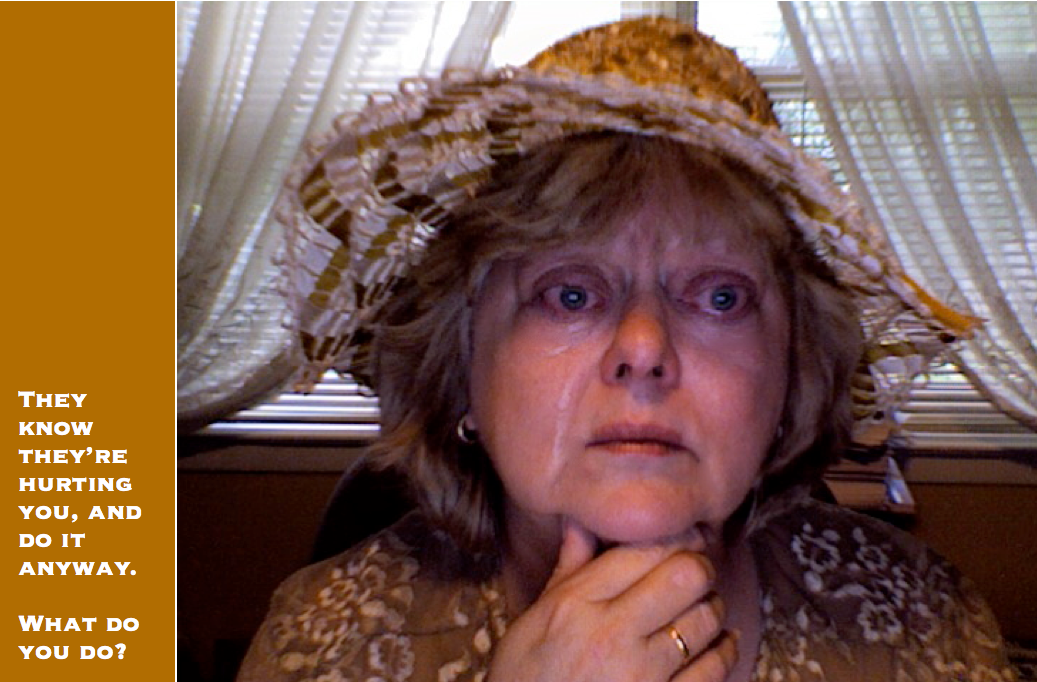LIVING OUR BEST LIFE: PART 2 ©2008, Vicki Hinze
Being disciplined. Discipline doesn’t come easily, particularly to creative types. Actually, I doubt it’s easy for any type, but where would we be without it? Whether it’s the discipline to stick with something from start to finish, to hold your tongue when you know you should but are mightily tempted not to, or to eat right and exercise, discipline is work. Today, with so many tools at our disposal that permit us to do more, it’s easy to get sidetracked and end up scattered or with diffused focus. But it isn’t only on what we do that discipline is required. It’s also on what we don’t or shouldn’t do. It’s following through, following up, carrying on.
When we’re in a rough patch, when our faith is tested, when we’re going through a time when it seems the evil in the world is nipping at our heels and eager to destroy our joy and all that is good and makes our lives worth living—or when someone is making a concerted effort to steal our joy or destroy our reputation, credibility or just to make life miserable, there is comfort and solace to be found in discipline. We all have times that try our souls. If our faith is strong, we aren’t exempt. Actually, we’re warned we’ll be persecuted and tried stronger. But discipline can serve us well in these times. It can send us back to prayer when we’re wondering if God’s listening. Remember Jacob? Isaiah? Remember David and Moses and Joseph (who became, in effect, the Prime Minister of Egypt)? And what of the Apostles? Of Paul! Oh, but these men of great faith endured horrifically trying times and, in each case, we can see that discipline factored in their path to wisdom and played a significant role in their relationship with God.
Embracing honesty. King David claimed my mind on this trait or aspect of wisdom. He did something horrible he shouldn’t have, suffered mightily for it, and found no relief until he was honest about what he’d done and accepted responsibility for it. When he did, he humbled himself before God and God forgave David. He lived the consequences of his dishonesty and experienced them full force for as long as it took him to truly comprehend the lack of wisdom in that course of action. Could he have become the man he became without the wisdom gained from those insights? I don’t believe he could. I don’t believe any of us can. With each experience, we are no longer the person we were; we are the person we become. If we take into context all these traits of wisdom, we can see how they combine and interact. King David’s experience evidences that, and illustrates to us the significant role honesty plays on our road to wisdom—the path to knowing God, from whom nothing is hidden. He doesn’t pay so much attention to what one professes with the mouth, but pays a great deal of attention to all that lies in one’s heart. If deceit and deception reside there, one is no friend to wisdom and is not right with God. Like David, one must humble oneself first, admit the truth, ask forgiveness for it, and then God responds. Wisdom is in recognizing why this is the required path, why dishonesty has no place in a wise heart and only creates distance between one and God.
Embracing tact. Tact is a bit of an art, and often people underestimate its value. There is a way to say what needs saying without drawing blood. One of the most frequently noted errors when it comes to tact (or a lack of it) is that a person will attack another person rather than the challenge. (Making it personal.) “It’s broken” is equally effective at making the point but far gentler than “You broke it.” Tact is seeing through compassionate eyes and through a compassionate heart. One doesn’t blossom, grow or flourish under a barrage of pointed out flaws, errors or mistakes. Instead, focus on solutions, and before we speak, we should emulate Solomon and weigh the impact of our words on the other person. How will what is said be taken? Is it our intention to convey that this way?
Perhaps this is one of the reasons that we’re warned that the tongue is double-edged. It can save or destroy us. If we think first, with our minds and hearts, and then speak, odds are better that we what we say will be more temperate and well received. If we place ourselves on the receiving end of what we say, and ask how we would react, we are emulating grace and mercy, too, and those are qualities of wisdom.
Tact isn’t always easy or expedient. It doesn’t always give us the satisfaction of telling one who has been causing us challenges just what we think of their actions. But as good as that type thing might feel for a moment, it feels bad for a lot longer because it resolves nothing and creates even more tension. Tact isn’t being dishonest. It’s expressing what needs to be expressed in a way that is not absent of kindness, compassion, respect and civility. It’s treating others as we wish they would treat us. And in that, there is an abundance of wisdom. It does require that we look out, at others, as much as we look in, at ourselves. And that’s where most get into trouble with tact. As we would have them treat us. That’s wise, and a great place to start embracing.
Embracing mercy. A heart without mercy deserves none. I’ve forgotten where I first heard that now, but I’m grateful that God is merciful and doesn’t demand from us that feel the full brunt of all we deserve. I doubt any mortal could withstand it. But mercy isn’t about what we deserve or it wouldn’t exist. Mercy is a gift we’re given from a loving heart. Maybe it’s for something we did, or for things we should do and haven’t. Regardless of the reason, without mercy in our character traits, we lack a key quality expressed verbally and through the actions of Christ. We know He was wise. We’re clever enough to deduce that such a dominant character trait in a wise man surely equates to it being a trait of wisdom itself. Could wisdom exist without mercy? I don’t believe it could. I believe we’d be crushed under the errors we make long before we got anywhere near wisdom. Without mercy we’d be lost. But receiving mercy, a blessing to be sure, is no greater blessing than being merciful. In being merciful we emulate Christ. We embrace that which He embraced, and honoring Him definitely brings us closer to God.
Embracing righteousness. In each moment of each day we make choices. Those choices are to choose righteousness or to turn away from it toward sin. We make the call. I’m not talking about self-righteous behavior, which is often rooted in arrogance or a misplaced sense of entitlement, but righteousness in the eyes of the laws of God. When we walk with Him, in His way, doing our best to follow His laws His way, then we’re closer to Him. We’re adopting wisdom, either on knowledge of it or on faith in it. And that coupled with grace invokes the promises God made to people who conduct themselves His way.
I started doing a little research on what exactly righteousness is—not the classic text-book definition, but how it’s described in the Bible. What I found fills a book—several books, and that definitely makes it a different exploration. For me, embracing His way is sufficient, and so I’ll leave this at that for now—and study more on righteousness on its own.
The value of wisdom is clearly outlined for us—the traits and characteristics of it, too. In Proverbs, we’re told to seek wisdom and it will protect us.
In examining this, it seems if we seek wisdom and embrace its traits, we probably have less need for protection than we would otherwise. There’s comfort in that. A tool God gives us to help ourselves…
Blessings,
Vicki





